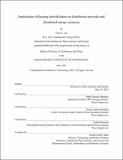| dc.contributor.advisor | Duenas Martinez, Pablo | |
| dc.contributor.advisor | Tapia-Ahumada, Karen | |
| dc.contributor.advisor | Botterud, Audun | |
| dc.contributor.author | Lee, Tony L. | |
| dc.date.accessioned | 2022-08-29T16:24:49Z | |
| dc.date.available | 2022-08-29T16:24:49Z | |
| dc.date.issued | 2022-05 | |
| dc.date.submitted | 2022-06-22T14:59:57.930Z | |
| dc.identifier.uri | https://hdl.handle.net/1721.1/144976 | |
| dc.description.abstract | The electricity sector’s transformation towards renewables, combined with technological improvements in electric appliances, has enabled electrification as a decarbonization pathway for other sectors. Electric heat pumps are an attractive solution for space heating, which is still largely served by direct combustion of fossil fuels. While current deployments are still low, widespread adoption of heat pumps is required to achieve emissions reductions consistent with global climate targets.
This thesis explores the impacts of residential heat pumps on electric distribution systems operations and planning. In the network studied, we find that heat pumps increase winter loads and reduce summer loads, leading to a winter-peaking system above 25% adoption and indicating near-term potential for “beneficial” heating electrification. Distribution issues emerge above 45% adoption on the network studied: substation-level transformers are the most immediate and costly investment need, and voltage quality becomes an issue near full adoption. Time-varying rate designs can induce consumers to shift heating demand and reduce peak impacts, increasing electrification levels on a constrained network from 45% to 50–60% with the rates tested. As heat pumps reshape residential electricity demand, accurate price signals for distributed energy resources are essential for efficient grid operation and investments. | |
| dc.publisher | Massachusetts Institute of Technology | |
| dc.rights | In Copyright - Educational Use Permitted | |
| dc.rights | Copyright MIT | |
| dc.rights.uri | http://rightsstatements.org/page/InC-EDU/1.0/ | |
| dc.title | Implications of heating electrification on distribution networks and distributed energy resources | |
| dc.type | Thesis | |
| dc.description.degree | S.M. | |
| dc.contributor.department | Massachusetts Institute of Technology. Institute for Data, Systems, and Society | |
| mit.thesis.degree | Master | |
| thesis.degree.name | Master of Science in Technology and Policy | |
